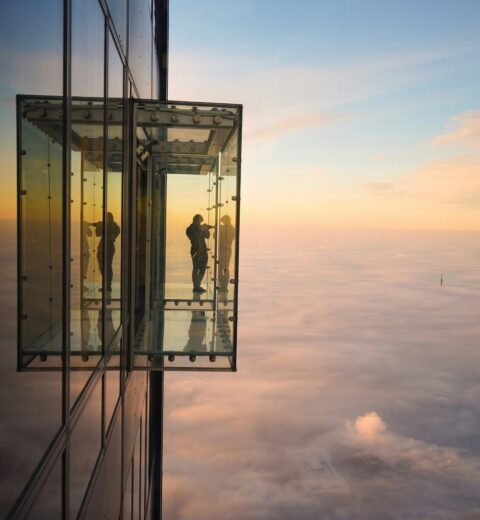Charity Incubator Helping Startups :: An Interview with Tom Previte @ Launch22
Week 24 – London. This week in The Workplace Series: We are featuring Launch22, a charity incubator founded by entrepreneur Eddie Holmes in 2014. Pier Paolo Mucelli, eOffice Founder and leading figure conducting this series of interviews, traveled to their hub in East London and met with Operations Manager, Tom Previte to learn the story behind this inspiring concept.

Tom, can you tell us about the history of Launch22?
Launch22 was initially called Launchpad and we first set up in the spring of 2014. The founder, Eddie Holmes, was mentoring for the Prince’s Trust when realised that there was not really any physical and private space for him to meet his mentees, only loud coffee shops. Hence, he wanted to create an environment where people could work in a private space and spend their days without the pressure of having to buy coffee. So, that was the original idea: a coworking space for people to just come in and work.
Launch22 is mainly set up with the experiences of entrepreneurs and functions as a charity. We work on a 30/70 model, which means that we give away 30% of the space to people who come from disadvantaged backgrounds, while the other 70% pay a discounted rate that also covers the percentage of those who do not pay.
When it comes to our product, we offer three main services. The first is the workspace, the second is the mentoring, and then we have a number of events including speed networking nights, pitch nights and social happenings.
Are your events open to everybody or just your community?
So, 90% of the events are open to external attendees. For instance, in speed networking, we invite anyone who is interested in starting a business or anyone who has been running businesses. The other 10% consists of internal, members-only events, such as the member’s pitch that allows the members to practice pitching to our mentors and get feedback that they can use to improve their business.

And how is the application process?
To become a part of the Launch22 incubator, you need to apply on our website and go through a short process. You will then receive an invitation to meet with us and talk about your idea and the reason behind it. This is followed by a tour of the space, and finally, we see if there are any applicable mentors or events going on that we can get you linked up with.
The whole idea is to understand what your needs are and to provide the help needed to run your business.
Which sectors are the businesses here from?
We actually have a great mix of 50 different companies that are based here right now, and since we are not sector specific, these vary a lot. In fact, we have everything from charities, to tech startups such as fin-tech and prop-tech, to fashion labels, consultancy businesses, and even coffee barista places. So, it is a really big range!
This nice collection of companies and the broad mix of people allows our members to use and show interest in each other’s services. We feel that Launch22 brings different peoples’ backgrounds and skills into one place, which is great.

So, regarding the startups. Once they have been accepted, how long can they stay in the space?
This is the main difference between an accelerator and an incubator: Normally, an incubator hasn’t got a set time period. Hence, the startups can stay here as long as both parts are happy, which varies a lot. One of the longest running companies has been here for one and a half years, but we also have companies who stay for three months at a time.
And do you run the program on a regular basis?
Yes, anyone can apply at any point. The mentoring is very flexible and it’s based on a time that suits both the members and the mentors. At the moment, we have 28 mentors with a broad range of experiences and skills sets that can range from law and IT work to marketing, sales, raising finance, and property development.
Do you take shares in the company?
No, as a charity there are no such incentives. We just take a small profit from the paying members, but that gets put straight back into the business and allows us to be self-sustaining.

Tom, can you tell us a bit more about the physical space here?
We manage one floor here and the design we have chosen is a very industrial look. When you enter, your come into the lobby area, that also functions as a meeting space. Then we have the workspace down in the main area with a long, upcycled table made of scaffolding poles and boards and a standing desks areas. In the back area, we have some fixed desks and the bean bag chill-out-area. We also have a storage space with a lot of startup books that members can read and a nice bicycle on display that adds to our atmosphere.
And how many desks do you have in total?
If everyone was sitting here at once we would have 40 spaces, but on average we get about 25 people per day because everyone is on different membership types and pop in at different hours.
Regarding your community, what are the main areas that the members are interested in?
What most people seek out in the mentoring is growth and scaling in terms of raising investment and generating their first sales. Our mentors can help with all of that and provides the startups with a connection to Venture Capital firms and angel investors. In addition, there is a high interest in proptech and fintech because we have quite a lot of businesses from these sectors. Therefore, we have a couple of mentors around these scenes.

Tom, can you tell us a bit about the technology in the space? Do you have any specific requirements from your clients?
When it comes to Internet, we have a built-in line with 400 downloads and 200 uploads. In addition, we have surround-sound music that we always try to keep on because we feel like it is a great addition to the atmosphere.
Regarding other facilities, we provide a kitchen with free tea and coffee, a meeting room, and printer access.
What are the main challenges and opportunities going forward?
A future plan would be expansion and growing our network. Since September 2015, we have had two Launch22 sites: this one in London and one in Liverpool. At the moment, there is a growing startup environment in Liverpool which we are very happy to be a part of. London is obviously fantastic as well, but also very oversubscribed with coworking spaces. Therefore, looking around for other sites in the UK and creating a network that connects all the sites together would be the best opportunity for us.
Finally, what is your view of the coworking market in London?
When we first launched and set up, this whole area consisted of old warehouses and not so many coworking spaces. Now, there are a lot more flexible offices and I think that, in addition to increasing business rates, the oversupply of coworking spaces in London will be putting a strain on the players in the market. At the same time, there are a lot of startups and a continuous demand for space. Hence, we will probably see more spaces opening outside of the centre and spreading out all over London.
If we view the market from the startups’ point of view, this is a good development because it provides the opportunity to find the perfect coworking space. For us in Launch22, that is positive because, at the end of the day, we are set up to help these guys and if we can help one or two companies raise funding and generate profit, that is a success in our eyes.





